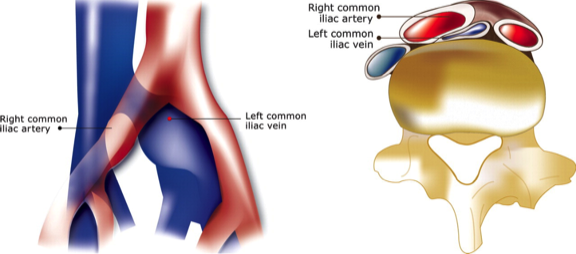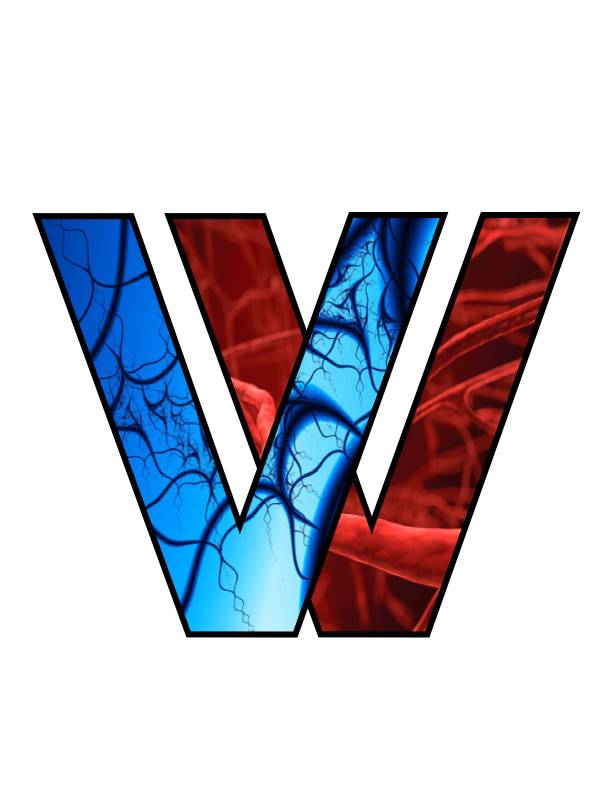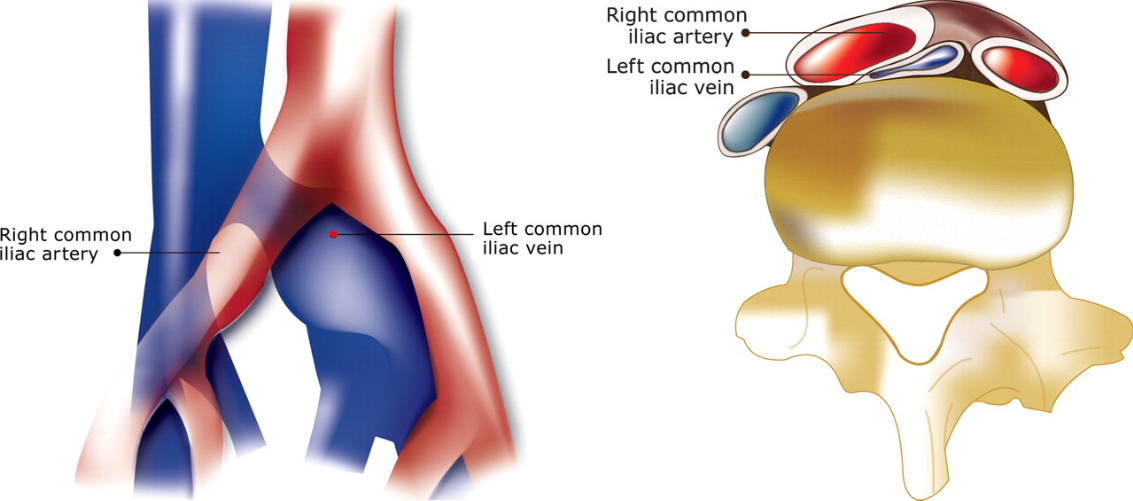-
Iliac Vein Compression
Iliac vein compression, sometimes referred to as May-Thurner Syndrome, is an anatomically variable condition of the left common iliac vein. It is described as compression of the left iliac vein, by the right common iliac artery against the underlying spine, resulting in outflow obstruction, and possible subsequent development of a left deep vein thrombosis (DVT).
Iliac Vein Compression Left common Iliac vein being compressed by right common Iliac artery against the underlying spine.
Left common Iliac vein being compressed by right common Iliac artery against the underlying spine. -
What are the Signs and Symptoms?
Some people may have iliac vein compression and display no symptoms. If symptomatic, clinical signs and symptoms may include unexplained left lower leg edema, venous claudication (cramping in lower leg), recurrent DVT (deep vein thrombosis), varicosities, chronic leg pain, swelling, recurrent skin ulcers, skin hyperpigmentation, pelvic pain, varicose veins and post-thrombotic syndrome.
-
How is the Diagnosis Made?
Imaging modalities useful in the evaluations of Iliac Vein Compression include color Doppler ultrasound, Computed Tomography (CT), Magnetic Resonance Imaging (MRI) or Magnetic Resonance Venography (MRV). Other diagnostic imaging modalities include, Intravascular Ultrasound (IVUS), and Contrast Venography.
-
What is Doppler Ultrasound?
A Doppler ultrasound is a test that uses high-frequency sound waves to measure the amount of blood flow through your arteries and veins, usually those that supply blood to your arms and legs. Vascular flow studies can detect abnormal flow within a vein. It is non-invasive and easy to perform, and accurate in determining location, severity, and cause of venous insufficiency.
-
What is Computed Tomography (CT)?
A CT (computed tomography) is a series of x-rays taken with a special machine. Computers use these x-rays to create three-dimensional images.
-
What is Magnetic Resonance Imaging (MRI)?
An MRI (magnetic resonance imaging) is a test that uses radio waves and magnetic fields to create detailed images of the body. To improve the tests accuracy, physicians sometimes inject a contrast fluid (dye), to make veins more visible, this is referred to as an MRV (or magnetic resonance venography).
Inform your doctor if you are allergic to the contrast fluid (dye) given during MRV scan. -
What is Intravascular Ultrasound (IVUS)?
Intravascular ultrasound (IVUS), also known as endovascular ultrasound, is an imaging technique that uses a transducer or probe to generate sound waves and produce pictures of the insides of blood vessels. A special catheter with a small ultrasonic transducer on one end, is threaded through an artery or vein to the target location, where sound waves are generated by the transducer to produce images of the blood vessels and help physicians assess various conditions.
-
What is Venography?
A venogram is a test that allows your doctor to see the veins in your body, especially in your legs. A special dye is injected that can be seen on an X-ray. The dye lets your doctor see how blood flows through your veins and how healthy they are.
A venogram is used to diagnose deep vein thrombosis (DVT) or other abnormalities of your veins. This test can also help your healthcare provider diagnose other health problems.
Inform your doctor if you are allergic to the contrast fluid (dye) given during venography. -
Treatment
The goal of treatment for iliac vein compression is to open narrowed or blocked blood vessels in order to restore proper blood flow, relieve symptoms and reduce the risk of developing DVT. The most effective treatment for iliac vein compression is balloon angioplasty and stent.What is Balloon Angioplasty and Stent?Angioplasty is a procedure to open narrowed or blocked blood vessels that supply blood to your legs. Angioplasty uses a medical “balloon” delivered through a catheter, to widen blocked veins. Once the vein is open, the balloon is deflated and removed. Oftentimes, a stent, a tiny wire mesh device, is placed at the same time the angioplasty is performed to hold the vein open. Once placed, the stent remains in the vein.
-
Living a Healthier Life
Maintaining a healthier lifestyle can help slow disease. It can also improve the overall health of your blood vessels.
Exercise Daily
Frequent exercise is important for your health. Walking may improve your blood pressure and circulation. It helps your body develop many small artery branches (collateral arteries). These small arteries can improve blood flow around blockages. If you have diabetes, walking helps you control your blood sugar. To add walking to your day, follow these guidelines:- Start small. Walk to do errands close to your home.
- Walk on level ground, such as at a mall. Bring a friend or join a group to keep you going.
- Work up to walking for 30 minutes on most days.
Eat Healthy Foods
A healthy diet is a good way to lower your risk of disease. It helps prevent plaque build-up and reduces blood pressure and cholesterol levels. For the greatest health benefits:- Eat at least 5 servings of fruits and vegetables each day. They contain fiber, vitamins, minerals, and antioxidants.
- Limit red meat, dairy products, and processed foods. Instead, choose chicken, fish, or tofu.
- Bake, broil, or steam foods. They taste great and have less fat.
- Follow diet changes that can help control health problems. Use less salt if you have high blood pressure. Limit sugar and carbohydrates if you have diabetes.
- Eat smaller portions to reach or maintain a healthy weight.
Stop Smoking
Each cigarette you smoke damages your blood vessels. Smoking also decreases circulation. These tips may help you quit smoking:- Cut down slowly on the number of cigarettes you smoke each day.
- Set a date to stop smoking.
- Ask your surgeon about stop-smoking aids. Or ask your local hospital about stop-smoking programs if you need help.




